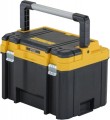Size
The main size of the container for tools. Inches are traditionally used for this designation, and the length is usually indicated as the main size. This information allows you to evaluate the "weight category" of the product as a whole, as well as to determine whether it is suitable for a particular instrument of large sizes. At the same time, the characteristics usually indicate the overall dimensions on all three main sides (in millimetres), however, it is more convenient for many craftsmen to use the size designation in inches.
For kits (see below), this paragraph indicates the dimensions of all containers supplied in the kit.
Сompartments
The number of compartments and/or pockets provided in the design of the tool container (with the exception of organizers, including those built into the lid — for them the number of cells is indicated separately, see below).
The more compartments or pockets, the easier it is to keep numerous items in the container at the same time. On the other hand, more compartments (for the same product size) usually means smaller individual compartments. The most modest models have
up to 10 compartments / pockets, in the most capacious this number can
exceed 30. Of course, when choosing by this parameter, you should take into account the type of container (see above). So, for traditional boxes, the maximum value is actually
20 compartments, and among backpacks there are models with
20 – 30 compartments.
Lid organizer
Availability
of a built-in organizer in the lid of the tool container.
The features of organizers are described in detail in paragraph “Type”; this type differs only in that it is built into the lid, and not made as a separate device. The combination of a box or case with an organizer allows you to conveniently store both large tools and small items such as fasteners or replaceable attachments in one container: the main volume is well suited for the former, the latter is convenient to keep in small cells of the organizer.
Organizer slots
The number of individual cells provided in the organizer. In this case, we can talk about an organizer as a separate device (see "Type"), or a set of cells built into the lid of the box (see "Lid with an organizer"). And for solutions with removable partitions, in which cells can be combined, the maximum number is indicated — with all installed partitions.
Organizers, by definition, are designed mainly for small things. Therefore, the more cells there are, the more varieties of small items can be stored in a container. For example, in 10 cells you can keep bolts of five different sizes and separately nuts for them. Such a number of compartments —
up to 10 — is generally considered small, but in fact it is often quite enough.
11 – 20 cells can be called an average, and the most capacious organizers have
up to 30 compartments. However it is worth considering that with the same dimensions of the container, an increase in the number of cells leads to a decrease in their volume.
Detachable tray
The presence
of a removable tray in the design of the container for tools (usually a box — see "Type").
The tray is an open platform — usually with recesses for easy placement of tools. On such a platform, you can lay out the items necessary for work, so that each time you do not climb deep into the box behind them; this is especially useful when tools need to be changed frequently during operation. And after hours, the tray is loaded into the box along with the tools, usually to the very bottom; in some models, the design of this “second bottom” is such that it can be quickly removed along with the entire contents of the box.
Recessed handle
The presence
of a recessed carrying handle in the design of the container.
Such a handle, as the name implies, when folded, is recessed into a special nest on the body, so that it does not protrude beyond the dimensions of the container and does not create unnecessary problems during storage and transportation. Note that in cases (see "Type") the handle is a harmonious continuation of the case, and this function is not used there (in fact, in such models, the handles themselves are clumsy). But in boxes where the handle is installed on the lid, a recessed design can be useful not only to reduce the size, but also so that another item can be placed on top of the box — for example, another box from the same set.
Modular system
A feature found mainly in drawers, organizers and trolleys (see "Type"). The meaning
of the modular system is that it allows you to put several containers one on top of the other, connecting them with special latches, and thus turn them into one common storage. At the same time, compatibility can be different, containers of the same brand and different types are often compatible - for example, additional boxes or organizers can be installed on some carts.

